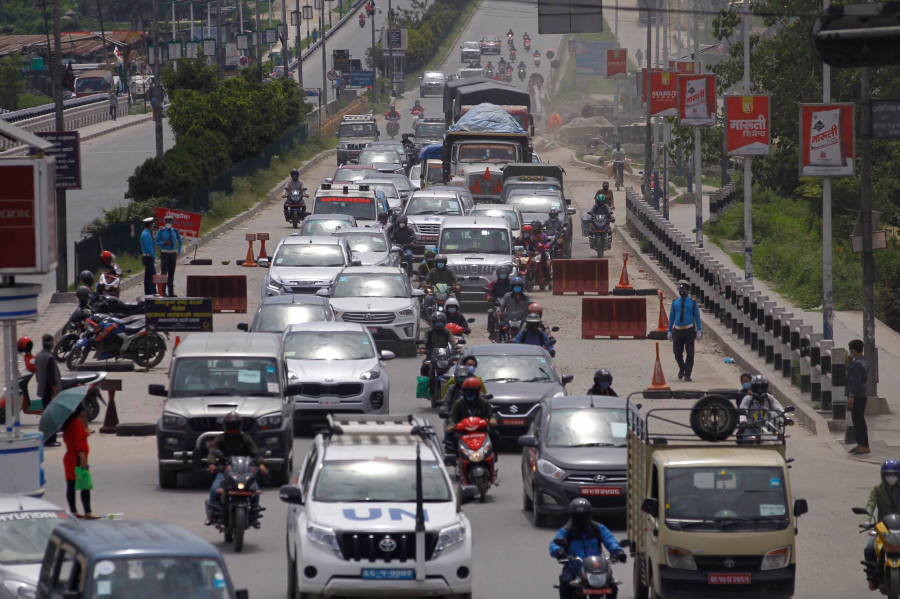Money
With economy hit by Covid-19, sales of motorcycles and cars down by up to 50 percent, dealers say
With continued restrictions on movement despite Dashain, when sales pick up, approaching, dealers are now pinning hopes on next year.
Tsering Ngodup Lama
In 2014, Bikash Oli bought his first motorcycle—a Bajaj Pulsar 150. For Oli, then an undergraduate student, the motorcycle became his primary mode of transportation.
When Oli graduated in 2017 and started working, he also began saving so that he could upgrade his motorcycle. “I have always enjoyed off-road riding, and I wanted my next motorcycle to be something that could handle off-road terrains,” said Oli.
By early 2020, Oli had saved enough and had zeroed in on a few models. “On top of the list was Hero Xpulse 200. The motorcycle was well within my budget and it seemed like a decent off-roader, too,” said Oli. “Having saved enough, my plan was to buy a new one this year.”
In March, which is when automobile dealers start announcing their Nepali New Year offers, Nepal went into lockdown to curb the spread of the coronavirus. When the lockdown protracted for months and the economy took a hit, Oli's salary was significantly deducted.
“I realised that buying a new motorcycle in the uncertain economic climate wasn’t a wise decision,” said Oli.
During the first nation-wide lockdown, 90 percent of economic activities in the country came to a halt. Businesses, big and small, are struggling; thousands of jobs have been lost, and pay cuts have become the norm across industries. In a country where automobiles are generally expensive, Covid-19’s impact on the economy and the lockdowns have caused automobile sales figures to hit record lows.
And with infections on a steep rise, industry stakeholders aren’t very optimistic about the foreseeable future.
“The nationwide lockdown was announced at the peak sales time,” said Ramesh Danekhu, marketing communications manager at Morang Auto Works, the authorised distributor of Yamaha two-wheelers in Nepal.
After Dashain and Tihar, sales of vehicles are normally high during the Nepali New Year in mid-April.
Yamaha, according to Dhaneku, makes 20 percent of their annual sales during the Nepali New Year period. “But this year, due to the lockdown we had zero sales,” said Danekhu.
After the lockdown was lifted on July 21, industry executives said they were hopeful that things would get better. Accordingly, they started launching schemes and discounts offers.
Yamaha offered two-wheelers on zero down payment and zero percent finance; HH Bajaj, the authorised distributors of Bajaj two-wheelers in Nepal, offered discounts for customers purchasing motorcycles in cash, zero percent interest for customers willing to pay 50 percent down payment; Jagdamba Motors, the authorised distributors of TVS motorcycles in Nepal, offered zero percent interest rates and a long term EMI.
The schemes and offers did help in garnering interest.
“When the lockdown was lifted, our showrooms saw a lot of footfalls. There were a lot of enquiries,” said Danekhu.
“Sales figures too were encouraging.”
Danekhu said Yamaha even managed to meet its Shrawan month’s [mid-July to mid-August 15] target.
TVS and Bajaj said they did decent business.
“After months of zero-sales, the business after the lockdown was a huge boost to us,” said Punam Singh, assistant general manager-marketing at HH Bajaj.
Apart from the schemes and offers, there were several factors that led to the surge in demand post-lockdown, say auto executives.
“The four-month-long lockdown created pent-up demand. When showrooms finally opened, people flocked to buy motorcycles,” said Deepak Agrawal, vice president of Jagdamba Motors. “There was also a segment of buyers who bought motorcycles because Covid-19 has made travelling in public transportations risky.”
With the odd-even rule for vehicles, there were four wheeler owners buying two wheelers as an alternative mode of transportation, said Agrawal.
But the segment of buyers that was largely missing, say auto executives, were those purchasing a second motorcycle or upgrading to a new one.
“The economic uncertainty has made people very conscious about spending. Another reason people don’t want to spend their savings is because they are largely worried for medical care,” said Singh.
According to the import data of Trade and Export Promotion Centre, Nepal imported two-wheelers worth Rs18.76 billion in the 2019-20 fiscal year, a decline of 18.11 percent compared to the 2018-19 fiscal year when the figure stood at Rs22.91 billion.
There has been a gradual increase in the import of motorcycles in the past few years with the import bill of Rs15.37 billion in the fiscal year 2015-16, Rs20 billion in the fiscal year 2016-17, and Rs21.74 billion in the fiscal year 2017-18.
While two-wheelers recorded encouraging sales when the lockdown was lifted, the same wasn’t the case for four-wheelers. Unlike two-wheelers, buying a four-wheeler—the least expensive of which cost two million rupees—in Nepal is a high-value investment.
To woo customers in these difficult times, four-wheeler brands did come up with offers and schemes. Laxmi Intercontinental, the authorised distributors of Hyundai cars in Nepal, offered cash discounts on certain Hyundai models and service vouchers to medical workers.
“When we reopened in July we adopted stringent safety measures at all our showrooms and service centres too and even offered online booking options for our customers,” said Rupesh Sharma Bhatta, general manager of Laxmi Intercontinental, the authorised distributor of Hyundai cars in Nepal .
But that did not help much.
At Hyundai, overall sales have been down this year by as much 40 to 50 percent compared to last year and in the month between the time the lockdown was lifted on July 21 and and prohibitory orders came into place on August 19, sales have been down 30 percent, according to Bhatta.
Many customers who had booked cars before the nation-wide lockdown, say auto executives, have also decided to postpone purchases for now. “Given that a lot has changed in the past few months, some customers who have booked cars with us have opted to wait for the time being,” said Bhatta.
The story is similar in the case of Maruti Suzuki cars, the other popular brand.
“When the first phase lockdown got over, we did see an encouraging number of enquiries, but those enquiries didn’t really convert into sales,” Karan Shakya, senior manager-marketing at CG Motocorp, the authorised distributor of Maruti Suzuki cars in Nepal. “It didn’t help that since November 2018, Nepal Rastra Bank directive only allows banks and financial institutions to only provide up to 50 percent as loan against the actual valuation of vehicles, which means customers have to pay 50 percent down payment.”
Sales have declined by nearly 50 percent compared to last year’s business during the same period, said Shakya.
According to the data of Trade and Export Promotion Centre, the country imported cars, jeeps and vans worth Rs12.91 billion in the fiscal year 2019-20, a sharp decline of 26.56 percent compared to the fiscal year 2018-19 when the import figure stood at Rs17.58 billion.
Similarly, the country imported cars, jeeps and vans worth Rs12.94 billion in 2015-16, Rs16.83 billion 2016-17 and Rs17.97 billion in the fiscal year 2017-18.
The Trade and Export Promotion Centre figures do not include customs duty. According to the integrated custom rate 2019-20 of the Department of Customs, the customs duty for two wheelers varies between 105.66 percent to 135.04 percent while that for four-wheelers is between 225.44 percent to 306.8 percent depending on the cylinder capacity.
According to Krishna Prasad Dulal, president of Nepal Automobile Dealers’ Association, overall vehicle import has plunged by 50 percent compared to the same period last year.
“Be it two-wheeler or four-wheelers, the whole industry has suffered huge losses, and until and unless life doesn’t go back to normalcy, the industry will continue to incur losses,” said Dulal.
With cases of the coronavirus rising and uncertainty over how long the prohibitory orders in different parts of the country will continue, automobile dealers are worried because Dashain and Tihar are nearing.
“The months from September to November are the most important months for automobile companies in Nepal. This window is when our company makes 40 percent of its annual sale,” said Shakya of CG Motocorp.
It’s best not to have any hope for this year, says Dulal. “Given how the Covid-19 situation is in the country, it’s best the automobile industry forgets this year,” said Dulal. "All we can do is hope that by next year, some semblance will return and we can all focus on getting our businesses back on track."
(Krishana Prasain contributed reporting)




 16.12°C Kathmandu
16.12°C Kathmandu













